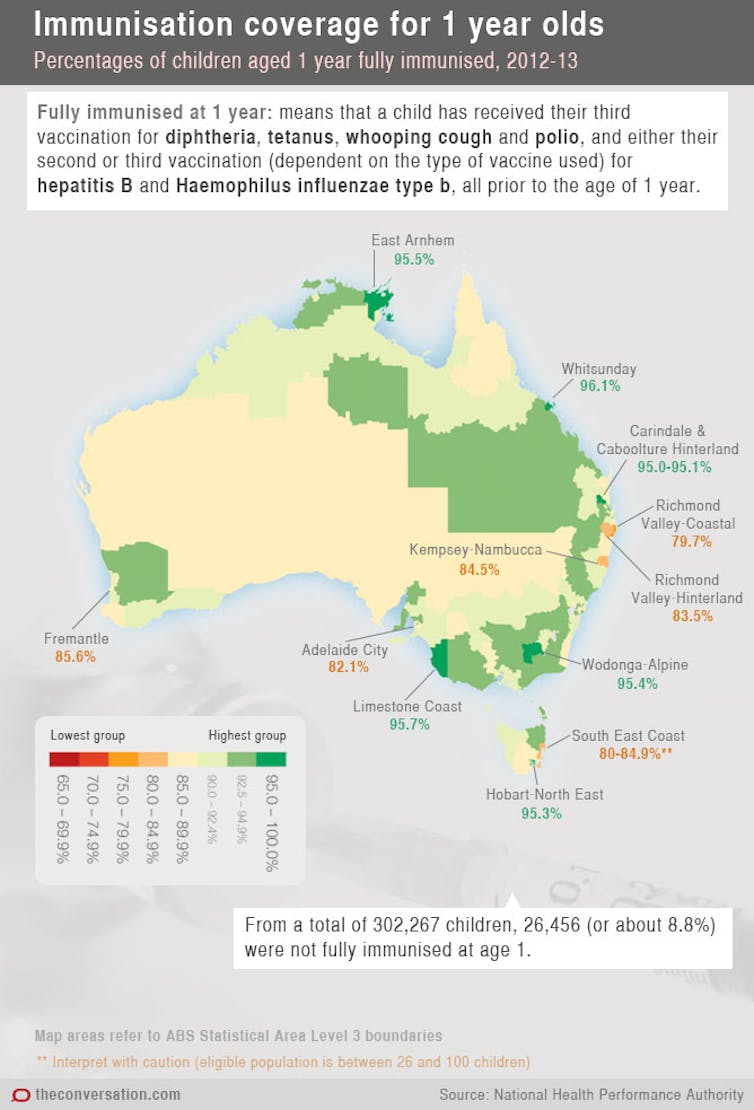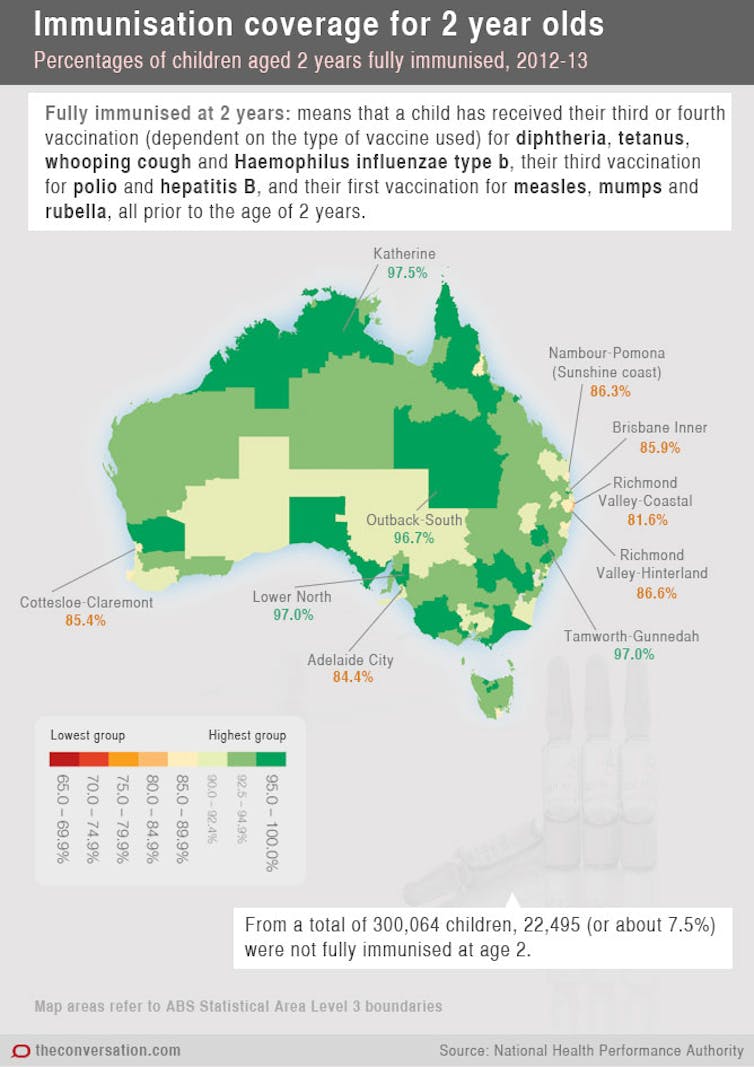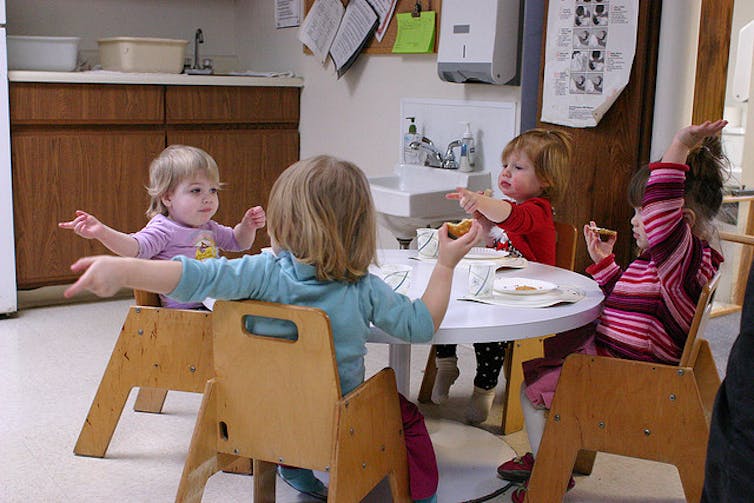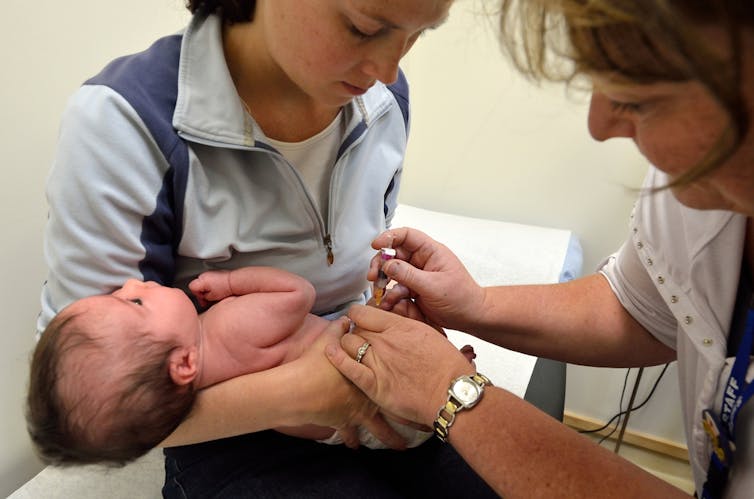Immunisation in Australia isn’t compulsory – and doesn’t need to be controversial. Most Australians recognise the incredible benefits that vaccination provides to prevent serious disease; we have high and stable coverage rates of around 93%.
Getting childhood immunisation to the 95% target rate would be even better, providing more individual protection and “community immunity”.
However, the McClure Review recommendation that child and youth welfare payments be conditional on having up-to-date immunisation is not the answer to maintaining or improving vaccine uptake.
Nor is the Productivity Commission’s recent suggestion that parents who have not had their child fully vaccinated should not receive the childcare benefit tax rebate the right way forward.
Most parents whose children are un- or under-vaccinated need more support to help protect their child: a carrot rather than stick approach.
Why aren’t all children vaccinated?
Financial incentives are in place to encourage parents get their child to the clinic multiple times early in life to get their shots on time. We all know this can be challenging.

Research tells us that parents of the 7% of incompletely vaccinated children fall into two distinct groups.
The first group, more than half of the 7%, face practical, economic, social or geographic impediments to full and timely vaccination. They are more likely to experience poverty or social exclusion.
A smaller proportion, estimated at 2-3% of the population, have beliefs, attitudes and concerns that cause them to reject or delay some or all vaccines.
In addition, some parents who are up-to-date with their child’s routine immunisation can be hesitant or uncertain about vaccines. Who can blame anyone for having questions about vaccines when misinformation abounds, promulgated by small fringe groups.

Reminding and supporting parents
Recent changes to childcare legislation in New South Wales require parents to provide documentation about their child’s immunisation when they enrol into childcare. Other states are examining the legislation and Victoria plans to follow suit in 2015.
This is a great initiative for a number of reasons. First, it provides another “reminder point” to check on a child’s immunisation status and gives an opportunity to enrol the child in a “catch up” program.
Second, it requires that parents who actively decline vaccination have visited an immunisation professional or GP to discuss their decision. If those parents continue to choose not to vaccinate, they need to produce a signed objection form.
Parents who follow any of these options are currently eligible for the childcare rebate.
Unfortunately, these system improvements have been characterised by the media as “no jab, no play”: that unimmunised children don’t have the right to attend childcare. This is blatantly untrue; “no form, no play” is more accurate but not as sensational.
To protect both themselves and others, unimmunised children are required to stay at home from childcare for weeks in the case of a vaccine-preventable disease outbreak, such as measles or whooping cough. This is a financial and practical disincentive for parents who don’t vaccinate their children.
Punishment can backfire
Removing welfare payments or childcare rebates for parents who do not fully immunise their children is unnecessarily punitive and could have a number of negative repercussions.
On the one hand, these measures are unlikely to influence the completely committed vaccine objectors. But not all parents who haven’t vaccinated are completely committed to that position.

On the other hand, removing incentives could paradoxically push very hesitant parents who have some willingness to immunise their children further against doing so.
Removing childcare subsidies carries the risk that children of low-income non-vaccinating families may not attend childcare or access much needed financial support to visit the doctor at all – a terrible outcome.
Removing welfare payments would obviously have a devastating effect on these children and their families.
History tells us that coercive policies can galvanise and further radicalise fringe movements. These proposals, together with a steady flow of adversarial public discussions, may actually increase exposure of everyone to anti-vaccination arguments and “normalise” vaccine objection.
Increasing vaccination rates
Strategies that increase the opportunity to vaccinate are most effective. Improving access, awareness and affordability could potentially boost coverage rates by as much as 3-4%.
Research shows that maintaining openness and trust is key to guiding parents to feel comfortable to immunise. This is also my experience as an immunisation professional who sees parents with low-vaccine acceptance.
Parents can change their position over time. A proportion of registered vaccine objectors have at least one vaccine recorded for their child: some have started the vaccine schedule but then ceased vaccinating or continue to selectively vaccinate.
Some registered objectors go on to fully vaccinate their children. The example of the mum who said “I never realised whooping cough could be so bad” and who went on to fully immunise her daughter after a prolonged hospitalisation for that preventable disease, springs to mind.
Having vaccine-hesitant parents engage with well-qualified health professionals who can take the time to address immunisation concerns is pivotal to helping them wade through the challenges that misinformation can create.

Another strategy that can work is grassroots campaigning for immunisation.
In the Northern Rivers district of New South Wales, which is notorious for low immunisation rates, a community movement called the Northern Rivers Vaccination Supporter Group is seeking not to demonise neighbours who don’t vaccinate, but to promote immunisation as part of a healthy lifestyle.
Their message of “love, protect, vaccinate” might not persuade the most ardent sceptics in their region, but it is going a long way to promote positive messages in their community and tell the real story of serious preventable illnesses.
A similar group in Western Australia, Immunisation Alliance WA, is supporting parents to get the best information about vaccines.
Finally, it’s important to remember the child in this debate. Good policy and practice should afford young children every opportunity to be both healthy through immunisation, educated through childcare, and supported in their family environment.
Let’s focus on improving opportunities for our kids, not punishing parents.

